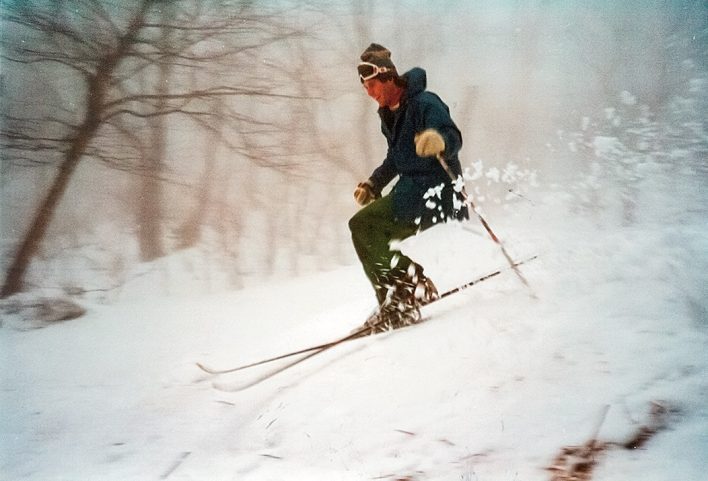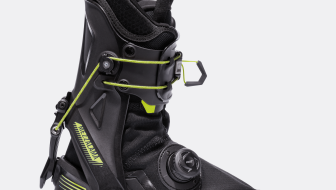I grew up on lore of the Air Bears, my dad’s infamous group of college friends turned ski squad. Throughout my childhood they gathered for ski trips in some of the world’s most iconic terrain—from the French Alps to British Columbia’s Rocky Mountains—but it all started with one winter in Wyoming.
Before having a wife and kids, pre-AIARE and mountain town housing shortages, my dad and his friends packed up an old, white Ford pickup and headed west. Their destination was Jackson Hole; their dream was powder skiing. They were young and glorious, thick-haired, strong-legged and fearless, standing at the edge of life’s commencement.
I didn’t know the origins of these young men until those fabled Air Bears gathered once more, this time not for a ski trip, but to celebrate my dad’s 60th birthday and support him as he recovered from brain surgery. They came from scattered corners of the country to a house my family rented in the small town of Waitsfield, Vermont, where they started skiing together back in college. It was there, over cake and craft beers, that we picked through faded pictures, showing me for the first time images of that winter in Jackson.
The year was 1979. The U.S. and Soviet Union were negotiating arms limitations, Michael Jackson had just released his first solo album, and four 20-year-olds from the East Coast had embarked on a journey to a new world—far from home, beyond the confines of college classes—all for the love of skiing. Founded just 14 years earlier, Jackson Hole Mountain Resort had yet to know its legendary Air Force or Teton Gravity Research. It was simply a stronghold of the Wild West with epic mountains and rowdy people.
That is most of what I knew of the town when, in the last days of November 2020, I crested Togwotee Pass, not in a white Ford pickup, but a green Subaru, and caught my first glimpse of the Tetons—41 years and one month after my dad did.
In those photographs and the reminiscent stories they evoked, I had been captivated.

Like my dad, I went for the skiing. I wanted steeper turns, deeper powder and a taste of the wild freedom that steeped the Air Bears’ Jackson lore. And ski I did. From chest-deep powder days and moonlit skins to morning Teton Pass laps and backcountry side hits, every new experience drew me deeper into the ski bum life.
Skiing was Jackson’s life blood—that which coursed through every vein and vessel, every tap and draft, through every ridge and valley, down every trail and skintrack—and it had drawn me there. But I never could have imagined that the heart from which it pulsed, the beat that maintained such life, was not the craft itself, but the community it attracted.
I met business school graduates driving snow cats, kids raised on cotton farms teaching big air classes, Ivy League attendees winter car camping and former gymnasts throwing backflips on snowboards. That was the beauty of Jackson, and as we all chased pow stashes and fresh lines, they exposed me to new perspectives and diverse lifestyles.
Despite a four-decade gap and differences in our experiences—my dad had a social scene and no snow, I was there during Covid and record snowfall—the experiences shifted something in both of us. Following his winter, my dad stayed in Jackson for the summer and eventually returned two years later for a second winter after graduating college. For me, it was on to Alaska before heading back east to finish up school. Once I graduated—at a loss for what to do next—I moved to Utah to run it all back again, this time at Alta Ski Area. Like my dad, one winter wasn’t enough—I’m not sure two will be either. The Tetons made me feel so small and life so large; it was liberating and eye-opening and left me utterly lost as to where I wanted to take life next. How would I reconcile the identity and lifestyle of my winter in Jackson with the college-attending, career-searching person I was elsewhere?
Even if I spend my whole life trying to answer this, I’ve come to appreciate such reconciliation as the beauty of being a recovering ski bum: I had the chance to experience and take stock of life before embarking on it. Turns out, once upon a time, my dad felt it, too, and it wasn’t lost on him either. Though he resettled in his home state of Vermont, far from those iconic Tetons, for one week a year he indulged the powder-chasing part of himself that had been awoken so many winters before in Wyoming, jetting off with the Air Bears and stepping back into that world once again.
As for me, it’s too early to say how it will pan out—for now, I’m happy to have found a job with a certain magazine where I can indulge my interest in writing among a devoted group of winter enthusiasts (a far cry from the international development work I’d imagined myself doing post-graduation). Wherever I end up, though, I’ll be damned if big mountains and deep skiing become sequestered to a single week each year.
Greta Close spent her first 20 years in hockey skates. Then she learned to ski. In the two years since, she’s tasted the ski bum lifestyle and, through it, has discovered a part of her dad she didn’t know before. Greta is an associate editor for Backcountry Magazine.
This article was originally published in Issue 147, The Huts Issue. To read more, pick up a copy at backcountrymagazine.com/147 or subscribe.









Ugh. Poor Jackson. Stop moving west please.
This is an awesome tribute to fathers, to passion, to stoke, to friendships and shared experiences, and to legacies. Thank you for inspiring me to set some kind of stoke example for my kids. They adventure with me now but are on the cusp of starting their own lives as young adults so I feel the window closing, and this story kinda propped it open a bit longer.
Skiing is a great age-defying connective sport that fueled a super fun family long weekend at Jay last winter. Time to start planning – trip for winter 23/24!!